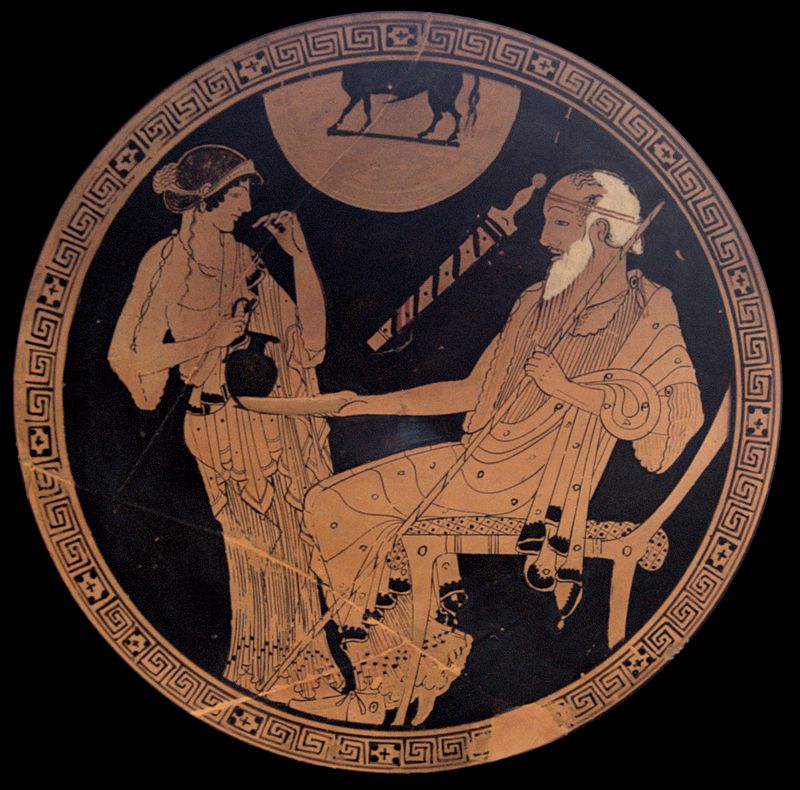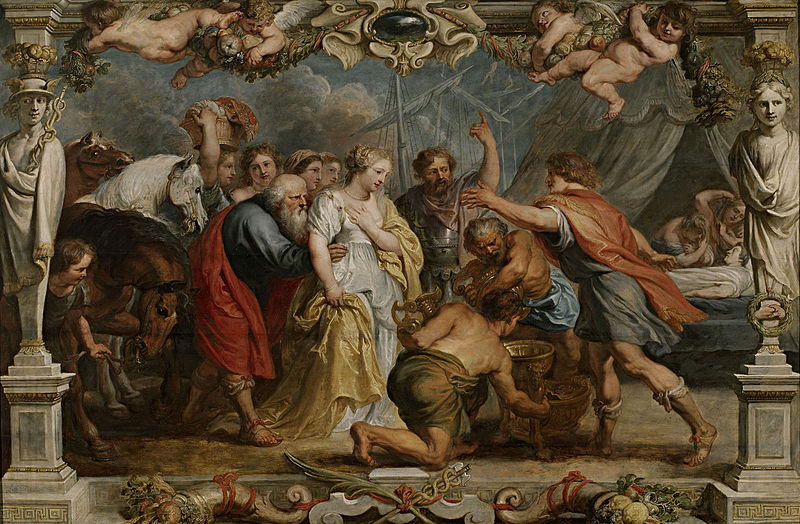Note: This essay was sent to me to be published anonymously. It is a powerful reminder that who you are fundamentally changes what the Iliad means and that the loudest voices are often the abusive ones.
CW: Sexual Assault
You hadn’t heard of Agamemnon when you started college. You didn’t know about the embassy to Achilles or Briseis or the wrath of the gods. You did know that you really liked this guy, let’s call him Carl, and you’d been hanging out with him for a while and you were excited to go to a party at his frat house.
If you had read the Iliad, you might have noticed that Briseis and Chryseis play an awfully big role for people who barely even speak. You might have thought it was weird that Agamemnon insists that he prefers Chryseis to Clytemnestra, but he would part with her if it’s for the best (εἰ τό γ᾽ ἄμεινον), because he’s so worried about the λαός—the people, but really the men. Turns out that sometimes men are only concerned about the well-being of men. But you didn’t see that on a first read anyway, and Homer couldn’t have really helped you navigate the men or the lions.

Agamemnon doesn’t want to part with Chryseis, but he will for a price. Or, more precisely, he will if he’s given a prize, a γέρας. Achilles and Agamemnon mention this all-important γέρας thirteen times in Book 1, and Agamemnon makes it very clear that he will not be prize-less (ἀγέραστος). We get another fourteen mentions of honor or dishonor (ἀτιμάω, τιμή, etc.), all of which have to do with the men involved. That’s a lot more than we hear about the women, the girls, whose feelings are inconsequential when men have their honor to worry about. The only feelings we hear anything about are the men—men cry, while women are bartered by men whose feelings are hurt.
Years later, you’d start to realize that words like assault and rape fit what happened to you that night, but that was after years of your pain being used as a punch line and a bargaining token among the brothers at this fraternity. Years of this being a story about how you were a slut and you shouldn’t have gotten so drunk. Years of ‘jokes’ about how you were ‘given’ to that man as a present, from little brother to big brother.

And really, the important thing is that Briseis doesn’t end up ruining the Greek army’s chance to win the war. Eventually, the men realize that it’s not worth getting upset over something as meaningless as a girl. As Achilles spits out the words ‘I will not fight with you for the sake of a girl’ (1.298), you feel it in your gut. Ajax says this to Achilles later too – you’re doing this over only a girl (9.637). What a senseless reason to disrupt the unity of the men. Bros before hoes has a longer history than you realized.
Over the next several years, you would remain friends with everyone at the fraternity. You were a liberated college student and not someone who would make a big deal about whatever happened to you. You’re not that kind of girl, and what did it matter that something happened to you that night, that something was taken from you, but you would never – still don’t – know what?
If you look through the Iliad to see what we actually hear about Briseis, you see that she mostly shows up in Book 1 and Book 9, which makes sense. But she gets mentioned in Book 24 in passing. Or, it would be in passing until you start to look for her, and you see that Briseis is sleeping near Achilles, after Priam’s visit. Until you read Silence of the Girls, you didn’t really give this much thought. You fell into the same trap that the Greek men do, you only thought that the men mattered. You don’t like that women are seen as objects, but it is what it is and, anyway, it was a long time ago. But what must it have been like for Briseis to sleep next to this man every night? The man who gave her to Agamemnon – did it matter that Achilles was mad about it? He still handed her over –and now possessed her again. What must it be like to lay next to him every night?

As it happens, you were such a cool girl who would never get hung up on silly things that happen at parties – honestly, what a funny mistake it all was! You were so cool about it that you kept coming back to Carl over the following years. Agonized over how he just wasn’t sure you two could date, because seeing you being assaulted was hard for him. You see, he felt like you’d betrayed him, and you were so sorry that you’d caused so much trouble. You kept seeing him, sleeping with him, understanding why he couldn’t date you, because this was really your fault anyway, and maybe you could show him that you could be trusted.
Now you teach students, and while you’ve always warned students about triggering content, you never really knew what that experience was actually like, to have old trauma wash over you with no warning. Not until Christine Blasey Ford testified about Brett Kavanaugh, and women in your life started holding each other tight to withstand the onslaught of stories about sexual assault and how boys will be boys. Something about the volume of women who were reliving their abuse at the same time was too much, and your body couldn’t hold it. A decade of grief poured out in gasping, shuddering tears that you didn’t know were being held in.
Briseis and the other enslaved women mourn for Patroclus, but Homer tells us that they’re also mourning their own pain. Like they needed something else to center their grief on, and once Patroclus was a vessel from grief, their own unexpressed grief poured out. You know that your students can’t prop you up if all this grief comes out in class, and you make it through the end of the class session, but your distance from this text is gone. You’ve fallen out of your own story and into this one. It’s safer not to talk about Briseis’ trauma in class anymore.

There’s no amount of philological rigor that can talk a body down that’s feeling dredged up trauma. You know that you aren’t enslaved and your family hasn’t been killed. You know that almost nothing about the Iliad is a particularly good fit for that night, but it’s not clear if you can separate the two stories anymore. You haven’t taught the Iliad since that day, but presumably you will have to again one day, and the thought is terrifying. Your body still holds the grief and the rage that you like to think your brain has processed, and what kind of a classicist can’t teach Homer anymore?
The academic part of your brain knows that no text is about one thing. The Iliad is about a million things, but for you, right now, it’s really just a story about how women have to pay terrible prices for what men want. How women have to suffer physical and psychological violence because men don’t want to be told no. For gold or glory or honor or because the gods were mad – what does it actually matter why? In the end, every woman in (or even just near) Troy is going to suffer because Paris and Agamemnon and Achilles want to take things that aren’t theirs. And how do you pull yourself out of that story enough to actually teach it?
If you or someone you know is a survivor of sexual assault and would like to talk to someone, there are a range of resources available from RAINN.org. (or call 1-800-656-HOPE) or NSVRC or helping survivors.org


Thanks for this. Thanks to the author and thanks to sententiaeantiquae for publishing.
Yes. Thank you for sharing this.
Please tell the writer of this essay that it is beautifully written and sent me reeling. I am grateful.